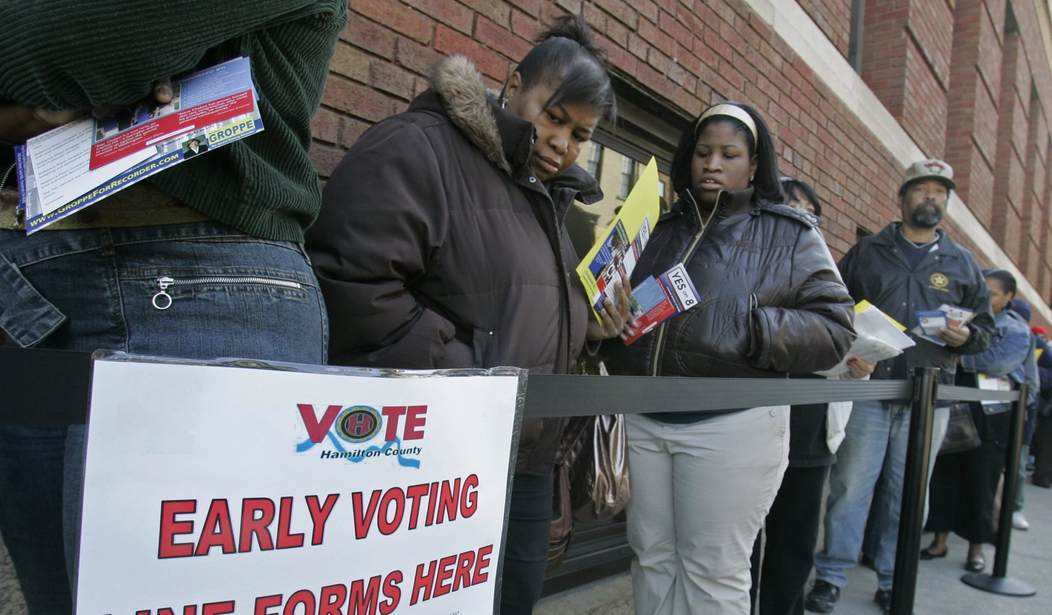Ohio Sen. Bob Seitz believes groups that urge county elections officials to extend voting hours because of things like traffic jams that slow travel to polling sites, or power outages that turn off voting machines, ought to pay for the extensions.
If and when Gov. John Kasich (R) signs Seitz’s SB 296, Ohio would become the first state in the nation to force voters to put up a cash bond to extend voting hours.
Opponents who have characterized the legislation as a poll tax say voting hours are rarely extended in Ohio, and then only because of acts of God like power outages or major traffic accidents.
Seitz disagrees. He said the recent history of polling place problems and the resulting extension of voting hours shows the cause is much more sinister.
Seitz wrote in an op-ed for Cincinnati.com that he only wants to “protect Ohio voters and taxpayers from deep-pocketed, special-interest attacks designed to manipulate an election in the final minutes of Election Day.”
He said that in the November 2015 and March 2016 elections “rogue courts” forced Hamilton County to extend polling hours at a cost of $57,000 “and forced inside poll workers to stay around for an extra 60 to 90 minutes after already working a 14-hour day.”
It was a software problem with voting machines that caused a judge to extend voting hours in the county in November 2015. The March 2016 decision to keep the polls open longer than scheduled, a judge ruled, was needed because a massive traffic wreck had kept several thousand people away from the polls.
But Democrat Sen. Cecil Thomas also penned an op-ed for cincinnati.com in which he argued SB 296 would violate the 24th Amendment to the U.S. Constitution, which abolished the use of poll taxes.
“The right of citizens of the United States to vote in any primary or other election… shall not be denied or abridged by the United States or any State by reason of failure to pay poll tax or other tax,” Thomas quoted the 24th Amendment.
“Those clear and simple words have been in our Constitution for more than a half-century. They are a fundamental piece of our civil rights,” he added.
Anyone who wants to keep the polls open later than scheduled because of unforeseen problems, like traffic jams or power outages, would have to be able to post a cash bond if Gov. Kasich signs SB 296 into law.
Sen. Thomas estimates the cost of such a bond could be “tens of thousands of dollars.”
“It’s a price most of us can’t afford to pay. It means only a lucky few, the wealthiest Ohioans, will have the option to extend polling hours and fix voting problems,” Sen. Thomas wrote in his op-ed “Senate Bill 296 attacks two fundamental American rights: our right to be heard in court and our right to cast a vote on Election Day.”
Seitz agreed there is “indeed a constitutional right to vote. But there is no constitutional right to vote late.”
Seitz argued that calling SB 296 a “poll tax” was discriminatory and offensive.
The Republican said it’s no coincidence that according to the American Civil Liberties Union’s records, those seeking extended voting hours since 2002 have been the Ohio Democratic Party, Obama for America, and a former Ohio secretary of state and a former Senate minority leader, both of whom are Democrats.
“It should be obvious who is trying to rig the system by stacking votes in counties where political benefits stand to be gained,” Seitz wrote.
Mike Brickner, the ACLU of Ohio’s senior policy director, and Christine Link, the executive director of the ACLU of Ohio, have written to Gov. Kasich, urging him to refuse to sign SB 296.
“Circumstances when polling places are kept open by judicial order are rare, oftentimes occurring as the result of massive technical problems or emergency situations that result in voters unable to cast ballots for long periods of time,” they wrote.
Every Ohio House Democrat voted against SB 296, with most arguing it amounted to the imposition of an unconstitutional poll tax.
“The GOP continues on their march to make voting harder in Ohio,” Rep. Kathleen Clyde (D) told the liberal website Think Progress.
But Republicans like Rep. Louis Terhar said such allegations were baseless.
“We already bend over backwards to ensure that all Ohioans have the opportunity to vote,” Terhar tweeted.
Rep. Robert McColley (R) pointed out in a tweet that “this bill (SB 296) DOES NOT reduce the more than generous amount of time that Ohioans have to vote.”
Seitz agreed it doesn’t make much sense for voters to go to court and put up a cash bond to keep polls open. The better option, he said, would be to just stay in line and be patient. Everybody in line before the polling places close has to be allowed to vote.
“For anyone who cares about the right to vote, it makes far more sense to be in line at your polling place on time than to drive to the courthouse, file a lawsuit, pay the filing fee, have a hearing, and then post a bond,” he wrote.
Seitz wants this settled before November. After all, Ohio was an important swing state in the 2008 and 2012 presidential campaigns.
He warned, “This awful precedent could well lead to chaos in this fall’s presidential election.”









Join the conversation as a VIP Member